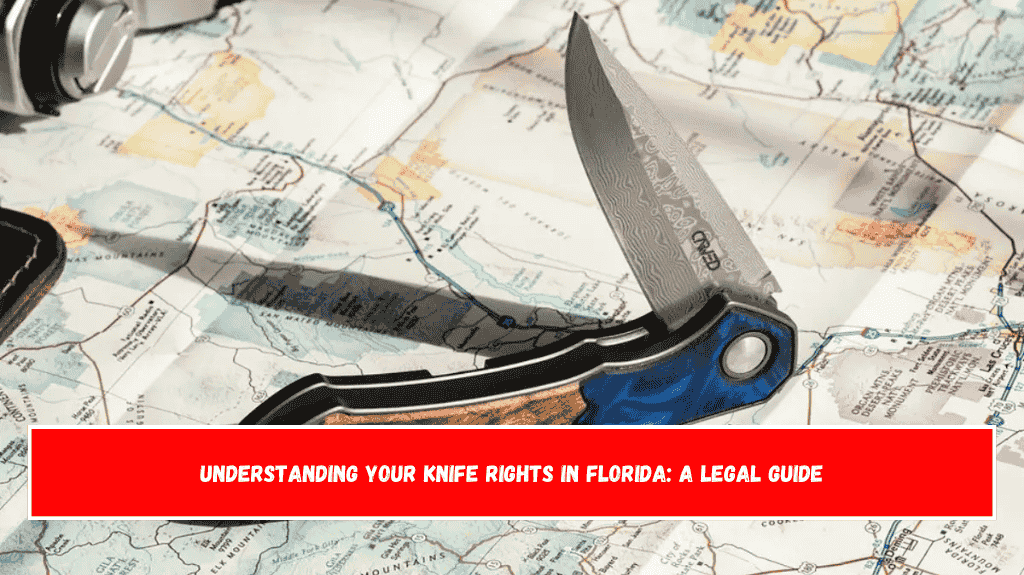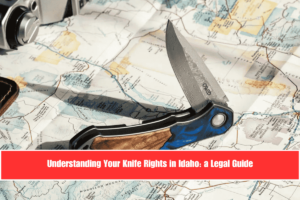Florida’s knife laws are relatively permissive compared to other states, but they include specific regulations on the types of knives you can carry, how they can be carried (openly or concealed), and where they are allowed. Here’s a comprehensive guide to understanding your knife rights in Florida as of 2025:
1. Types of Knives You Can Legally Own
Florida allows the ownership of most types of knives, including:
- Pocket knives
- Butterfly knives (balisongs)
- Switchblades and automatic knives
- Fixed-blade knives (e.g., hunting or kitchen knives)
- Machetes and Bowie knives
The only outright prohibition applies to ballistic knives, which are illegal to own, manufacture, sell, or carry under Florida Statute Section 790.225.
2. Open Carry vs. Concealed Carry
Florida distinguishes between open and concealed carry of knives:
Open Carry
- Most knives can be openly carried without a permit, provided they are not used in a threatening manner.
- Exceptions: Open carry is prohibited in certain locations, such as schools, courthouses, government buildings, and airports.
Concealed Carry
- As of July 1, 2023, Florida law allows permitless concealed carry of knives under House Bill 543. This means you can legally conceal a knife without a state-issued permit.
- However, concealed carry restrictions still apply to specific locations (e.g., schools and government buildings) and certain types of knives classified as “deadly weapons” based on their design or intended use.
3. Blade Length Restrictions
Blade length plays a critical role in determining how a knife can be carried:
- Knives with blades under four inches (e.g., common pocket knives) can be carried openly or concealed without a permit.
- Knives with blades longer than four inches may require additional scrutiny if concealed, as they could be classified as deadly weapons in some contexts.
4. Prohibited Knives
- Ballistic Knives: These are explicitly banned in Florida due to their potential danger as self-propelled weapons.
- Other prohibited actions include carrying any knife in restricted areas or using it in a threatening manner.
5. Age and Eligibility Requirements
- Individuals must be at least 21 years old to carry a concealed knife without a permit under the new law.
- Exceptions exist for active-duty military personnel and honorably discharged veterans.
- Selling or giving a knife to minors requires parental consent.
6. Restricted Locations
Carrying any knife—openly or concealed—is prohibited in specific locations:
- Schools
- Government buildings
- Airports
- Courthouses
- Polling places
Violating these restrictions can result in fines or criminal charges.
7. Legal Consequences for Violations
Carrying a prohibited knife or violating concealed carry laws can lead to:
- A first-degree misdemeanor, punishable by up to one year in jail and fines up to $1,000.
- Enhanced penalties if the knife is used in connection with another crime.
8. Practical Tips for Knife Owners
To stay compliant with Florida knife laws:
- Know the blade length and type of your knife.
- Avoid carrying knives in restricted areas.
- Use knives responsibly to avoid being perceived as threatening.
- Keep identification on hand if carrying concealed under the new permitless carry law.
Florida’s knife laws provide flexibility for both open and concealed carry but include important restrictions on blade length, location, and certain types of knives like ballistic knives. Staying informed about these regulations ensures safe and legal ownership and use of knives in the state.
Sources
- https://tkellknives.com/knife-laws-in-florida-a-comprehensive-guide-to-carry-legally/
- https://www.shieldon.net/a-guide-to-florida-knife-laws-carrying-straight-and-folding-knives/
- https://www.thedensonfirm.com/weapon-charges/florida-knife-laws-everything-you-need-to-know/
- https://nobliecustomknives.com/us-knife-laws/florida-knife-laws/
- https://www.thelawofwe.com/what-knives-are-illegal-in-florida/


















Leave a Reply